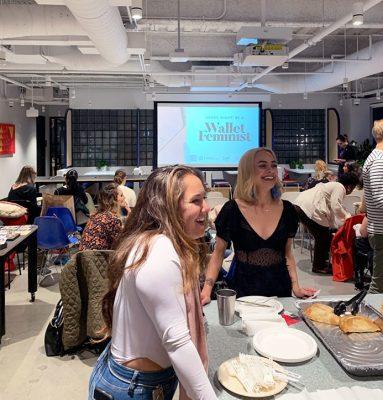In the business world, everyone is working to make money. Movies like “Wall Street” and “The Social Network” emphasize the cut-throat, male-centric, nature of the business sector. However, not all entrepreneurs are solely out for themselves. In the city of Boston, a large network of female entrepreneurs work not only for their businesses, but in support of each other. If you’re one of those entrepreneurs, sites like the360mag.com/three-things-to-consider-when-setting-up-your-wellness-business/ might be more than helpful.

The Boston Women’s Market, Dough and The Workroom hosted a panel titled “Be A Wallet Feminist,” featuring female speakers with female-owned and operated businesses on Oct. 9 at WeWork in Downtown Boston as a part of Boston’s annual Women Entrepreneurs Boston Week.
WE BOS, which has been commemorated annually by the City of Boston since 2014, sees various events promoting female entrepreneurs held across the city including the Boston Women’s Market.
Vanessa Bruce, one of the event’s lead organizers and co-founder of Dough, a company dedicated to highlighting female-owned businesses in order to maximize consumer spending power, discussed the lack of female empowerment that has become status quo in business.
“Just take a look at the stats, there’s the fact that only 4 percent of Fortune 500 CEOs are women and there’s also the fact that those stats are worse for women of color,” Bruce said in an interview. “The idea that as a conscious consumer we can direct our dollars to a brand and help them grow means more representation, means getting more women in the lead seat to help make more of those decisions and to distribute that economic equity.”
If everyone in the United States were to spend $20 a month at women-owned businesses, the companies would earn nearly five billion dollars a month, according to Dough’s website.
For Anna Palmer, CEO and co-founder of Dough, one of the barriers to female success in business is the Pink Tax, which refewrs to an extra cost that female consumers often pay for services or products as a result of gender discrimination.
“The Pink Tax extends to some pretty crazy things, even if you take your car out to a mechanic shop, women get charged about 20 percent more,” Palmer said during the panel. “One of the ways you can get around that is by supporting women with your wallet.”
Laurel McConville, founder of Nectar and Green, an organic cold-pressed almond milk company based in Boston and a guest panelist at the event, said in an interview that Nectar and Green is also working to support female-driven companies.
“We recently switched to a female-founded salt company,” McConville said. “That was an easy switch for us, we feel really good about it. The one purchase from us is tenfold the women you’re supporting.”
Gabriella McLellan, a software developer co-op at Amazon Robotics and a senior at the University of Massachusetts Lowell, served as a panelist and discussed the positive impact of being a conscious consumer at the panel.
“[With my wallet] I have this power that I can use … and I try to ethically source my products and be considerate about where I’m spending my money and that makes me feel really good and really proud,” McLellan said.
McConville also emphasized the power people have on social media to promote female driven businesses and the difference such a promotion can make.
“We live in a time where we all have an influence right in our pockets,” McConville said. “If you really like something and are excited about something, post it, share it, like it, comment, all of that. It’s an investment too.”























































































































